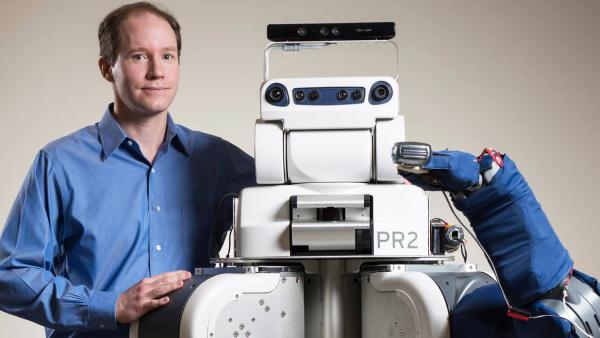Charlie Kemp, associate professor in the Wallace H. Coulter Department of Biomedical Engineering at Georgia Tech and Emory, has been selected to receive the 2017 Class of 1940 Course Survey Teaching Effectiveness Award.
This award recognizes no more than 40 Georgia Tech faculty members who excel in the eyes of their students measured by their scores on end-of-course instructor evaluations. Only faculty members with a high response rate and a near-perfect evaluation score on the Course-Instructor Opinion Survey (CIOS) are considered and nominations are not allowed.
Kemp’s research focuses on robotics with an emphasis on mobile manipulation and human-robot interaction in the context of healthcare. He has adjunct appointments in the School of Interactive Computing and the School of Electrical and Computer Engineering. He is the director of the healthcare robotics lab and is training the next generation of engineering students in healthcare robotics technologies, so they can better understand the changing needs of patients, their caregivers and healthcare providers.
The award is given by Georgia Tech’s Center for the Enhancement of Teaching and Learning (CETL). Award recipients will be recognized at the Center’s Celebrating Teaching Day on March 8, 2018.
Media Contact
Walter Rich
Keywords
Latest BME News
Commercialization program in Coulter BME announces project teams who will receive support to get their research to market.
Courses in the Wallace H. Coulter Department of Biomedical Engineering are being reformatted to incorporate AI and machine learning so students are prepared for a data-driven biotech sector.
Influenced by her mother's journey in engineering, Sriya Surapaneni hopes to inspire other young women in the field.
Coulter BME Professor Earns Tenure, Eyes Future of Innovation in Health and Medicine
The grant will fund the development of cutting-edge technology that could detect colorectal cancer through a simple breath test
The surgical support device landed Coulter BME its 4th consecutive win for the College of Engineering competition.
New research from Georgia Tech helps doctors predict how therapies will interact with a child's immune system, potentially improving outcomes and reducing risks.








